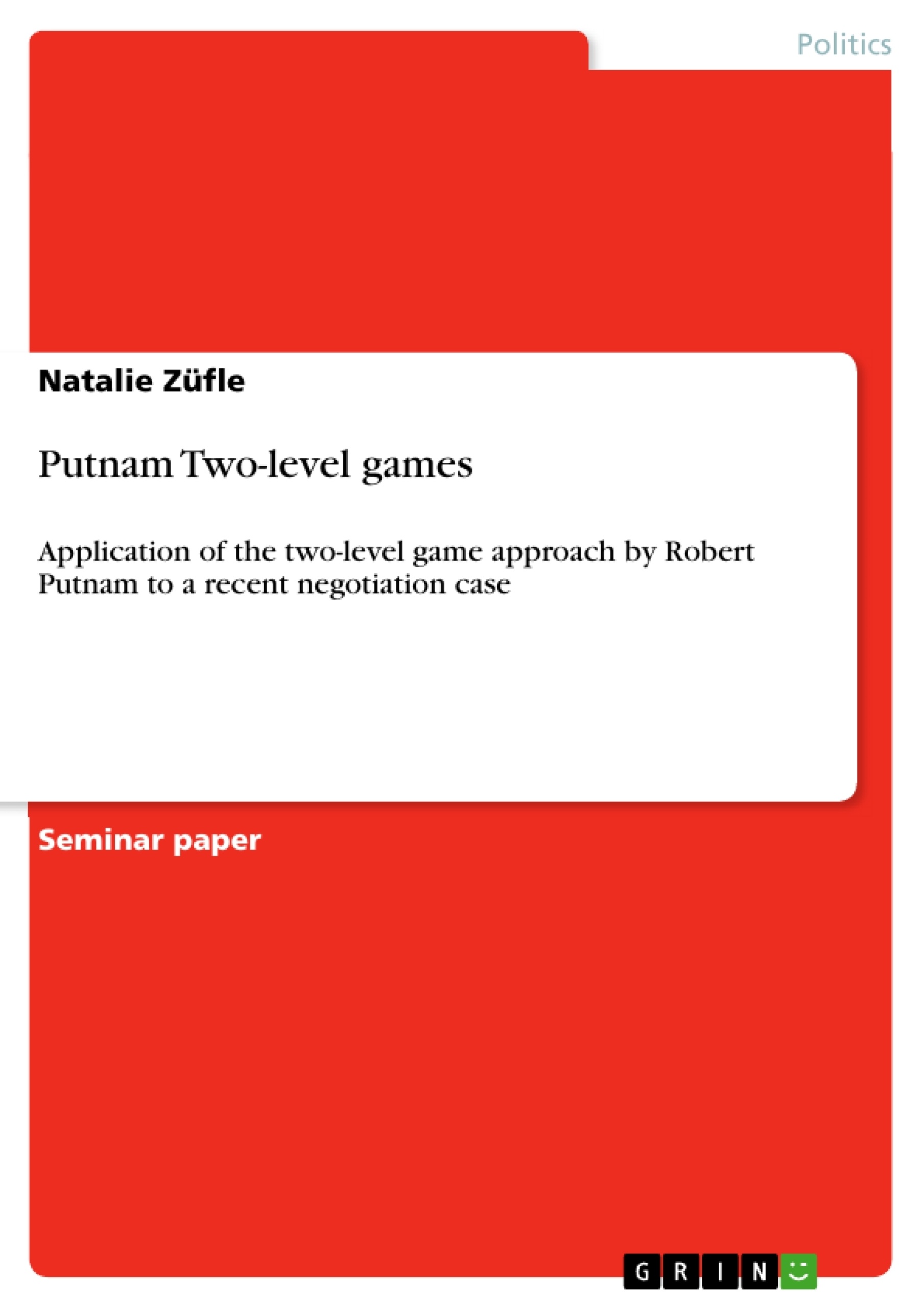An example of how domestic pressures can influence international preferences. In the case of Germany, domestic reservations of the population towards sending troops to Iraq reduced Schröder’s readiness to cooperate on the international level in the face of nearing elections. Endowed with a small win-set Schröder could refer to internal pressures, hence use a bargaining advantage for receiving concessions from the other side, and thus secure in the first place (his) domestic goals
Table of Contents
- Introduction
- Putnam's Two-Level Game Approach
- Germany's Decision Not to Participate in the Iraq War
- The Role of Public Opinion and the Win-Set
- Conclusion
Objectives and Key Themes
This paper aims to apply Robert Putnam's two-level game approach to analyze Germany's decision not to participate in the 2003 Iraq War. The analysis examines how domestic and international pressures influenced the German government's decision-making process.
- Putnam's two-level game theory
- Domestic political pressures in Germany
- International pressure from the United States
- The concept of the "win-set"
- The influence of public opinion on foreign policy
Chapter Summaries
Introduction: This paper introduces Robert Putnam's two-level game theory and its application to analyzing Germany's decision regarding participation in the 2003 Iraq War. The author outlines the framework of the two-level game, highlighting the interplay between domestic and international pressures on a state's decision-making processes in international negotiations.
Putnam's Two-Level Game Approach: This section details Putnam's two-level game framework. It explains the two levels of negotiation—level I (international negotiations) and level II (domestic ratification)—and how they interact and influence each other through reciprocal causation. The author explains that a successful international agreement requires a balance between satisfying both domestic and international pressures. The concept of "win-set," which represents the set of all possible Level I agreements that would gain the necessary majority among domestic constituents, is also introduced.
Germany's Decision Not to Participate in the Iraq War: This section applies Putnam's model to analyze Germany's decision not to participate in the Iraq War. It examines the conflicting pressures faced by Chancellor Gerhard Schröder: the US pressure for support on the international stage (level I) and the strong opposition from significant domestic groups in Germany (level II). This section describes the mobilization of public opinion against the war and the role played by various actors, including churches, unions, and the Green Party. The contradictory stance of the German media is also discussed, showcasing some internal divisions among elites.
The Role of Public Opinion and the Win-Set: This section analyzes the impact of public opinion on Germany's "win-set" – the set of acceptable agreements at the international level that could be ratified domestically. Because a significant majority of the German public opposed the war, Schröder's win-set was relatively small, limiting his ability to cooperate internationally. This small win-set, however, is presented as a bargaining advantage, allowing Schröder to leverage domestic constraints to secure concessions from the US. This section further explores how Germany's bicameral ratification process contributed to the small win-set.
Keywords
Two-level game, international negotiation, domestic politics, public opinion, Germany, Iraq War, win-set, Gerhard Schröder, ratification, coalition building, bargaining advantage.
Frequently Asked Questions: Analysis of Germany's Iraq War Decision Using Putnam's Two-Level Game
What is the main focus of this paper?
This paper analyzes Germany's decision not to participate in the 2003 Iraq War using Robert Putnam's two-level game approach. It examines how domestic and international pressures influenced the German government's decision-making process.
What is Putnam's two-level game approach?
Putnam's two-level game theory describes international negotiations as occurring simultaneously on two levels: Level I (international negotiations between governments) and Level II (domestic political processes to ratify international agreements). The success of an international agreement depends on the interplay and reciprocal causation between these two levels. The "win-set," the set of all possible Level I agreements that would gain domestic majority support, plays a crucial role.
What domestic and international pressures influenced Germany's decision?
Domestically, strong public opposition to the war, driven by various groups including churches, unions, and the Green Party, significantly influenced the decision. Internationally, pressure from the United States for German support was a major factor. The German media also displayed internal divisions reflecting the complexity of the situation.
What role did public opinion play in Germany's decision?
Strong public opposition to the war significantly reduced Germany's "win-set," limiting the range of acceptable international agreements that could be ratified domestically. Paradoxically, this small win-set also provided Chancellor Schröder with a bargaining advantage, allowing him to leverage domestic constraints to negotiate with the US.
What is the significance of Germany's bicameral ratification process?
Germany's bicameral system (two houses of parliament) contributed to the smaller win-set, making it harder to reach an agreement that satisfied both domestic and international demands. This complicated the ratification process and strengthened the influence of domestic opposition.
What are the key themes explored in this paper?
Key themes include Putnam's two-level game theory, domestic political pressures in Germany, international pressure from the United States, the concept of the "win-set," and the influence of public opinion on foreign policy decisions.
What are the key chapters and their summaries?
The paper includes an introduction outlining the methodology; a section detailing Putnam's two-level game; an analysis of Germany's decision not to participate in the Iraq War; a section focusing on public opinion and its impact on the win-set; and a conclusion. Each chapter provides a detailed analysis of the specific aspects related to the central research question.
Who are the key players mentioned in this analysis?
The key player is Chancellor Gerhard Schröder, whose decision-making process is central to the analysis. Other significant actors include the US government, various domestic German groups (churches, unions, Green Party), and the German media.
What are the key words associated with this research?
Key words include: Two-level game, international negotiation, domestic politics, public opinion, Germany, Iraq War, win-set, Gerhard Schröder, ratification, coalition building, bargaining advantage.
- Citar trabajo
- Natalie Züfle (Autor), 2009, Putnam Two-level games , Múnich, GRIN Verlag, https://www.grin.com/document/180074




